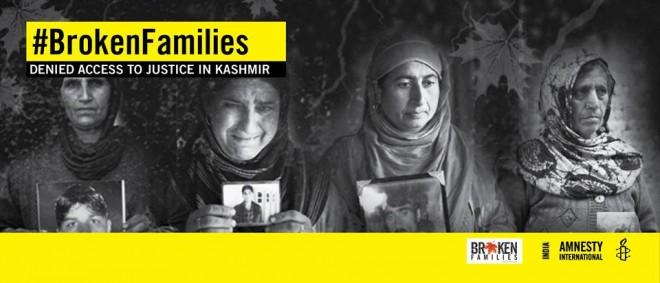
Human rights watchdog Amnesty International has set the stage for the Kashmiri families, whose members have been subjected to enforced disappearances, custodial killings or fake encounters, to raise awareness about human rights violations in the Valley. The AI has named its initiative "Broken Families: Denied access to justice in Kashmir."
Amid the current crisis in the Valley, these "broken" Kashmiri families, supported by Amnesty International, have embarked on a three city tour to narrate their stories of struggle for justice. The tour will be kickstarted in Bangalore on Saturday evening where an interaction of these families with the people would be moderated by veteran journalist Seema Mustafa.
Popular rapper from Kashmir Roshan Elahi, also known as MC Kash, would also be performing during the event. Over the years, the artists from the Valley including MC Kash have let their art form portray the human rights violations faced by the people of Kashmir.
MC Kash rose to fame with his rap song "I protest" during 2010 summer unrest in the Valley.
At a time when the Valley is on the boil for over a month now after the death of Hizbul Mujahideen commander Burhan Wani, various artists such as cartoonists, web designers, painters and musicians have staged unique protests against the killings through their art form.
MC Kash too hopes to raise the voices of Kashmir's mothers through his songs in Indian cities.
"It is the courage of these parents to never give up, which the world should know about," the rapper said in an AI video.
The report on human rights violations prepared by AI last year had taken into account many such cases where the families' cries for justice have remained unheard.
Among these include three families of Machil area in Kupwara district of North Kashmir whose sons left their houses on April, 28, 2010 for work only to be found dead the next day. The Army had also revealed that they have killed some militants in the encounter around the same time, which the families suspected are their sons.
Even as the police has filed cases against several Army personnel, the proceedings of the case have not been conducted and the wait of the families seem endless.
There are hundreds of such cases of broken families in the Valley, who have faced human rights violations of various degrees during the turbulent 90s and 2000s and for a majority of the cases, justice looks like a far-fetched dream.
Analysts say that the current unrest in Kashmir is largely due to the failed judicial system in the Valley.

















